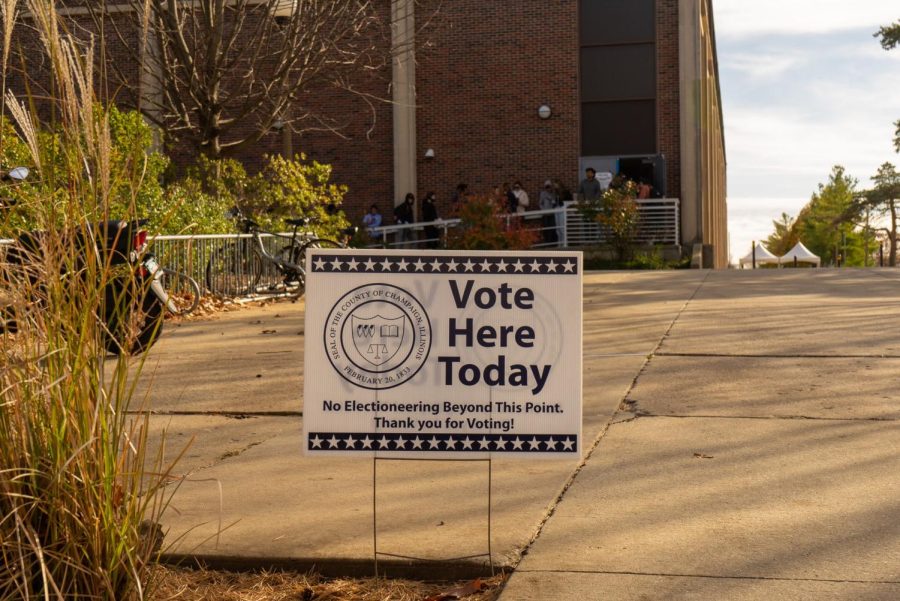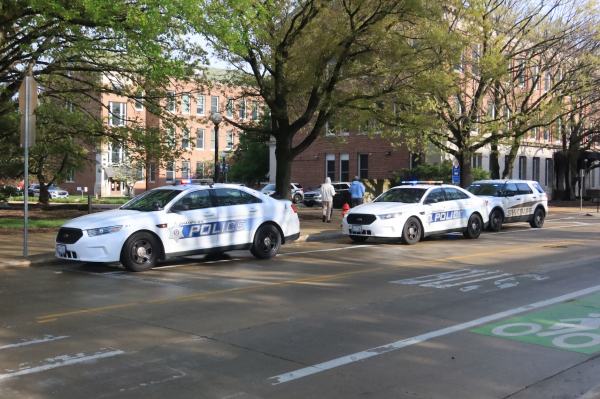UPDATE: Champaign municipal elections voter’s guide 2023
April 4, 2023
Mayoral Candidates
Deborah “Deb” Frank Feinen (INCUMBENT):
Feinen has been mayor of Champaign since 2015. Prior to her two terms as mayor, she served as an at-large representative on the Champaign City Council and vice president of the Champaign County Board.
Feinen told Smile Politely that the most important issue in this election cycle is local gun violence, citing the Champaign City Council’s allocation of 8 million dollars to the Community Gun Violence Reduction Blueprint as one of her solutions. The blueprint provides funding to community organizations and funds social workers at Carle Foundation Hospital who deal with trauma-affected patients.
Get The Daily Illini in your inbox!
At the 2023 municipal candidate forum, Feinen explained that the blueprint is one part of the “two-pronged approach” to public safety that her administration has taken. The other prong, policing, involved hiring new Champaign Police Department officers and changing CPD’s approach to hiring for the future.
Feinen also listed a new equity and engagement department as some of her foremost achievements during her term. According to an Illinois Newsroom profile on the candidate, she addressed the flooding in the Garden Hills neighborhood of Champaign, Champaign’s new low-barrier homeless shelter and hired a new CPD chief, Timothy Tyler.
Feinen contributed to Rodney Davis’s congressional campaign in 2015.
Update: April 4, 3:08 p.m.
In a call to the Daily Illini, Mayor Feinen called “continuing to address gun violence in our community,” the most important issue in the election.
Feinen mentioned the 2022 Community Gun violence Reduction blueprint–which she said was funded by “a little over a million dollars” of Federal American Rescue Plan funds–as an example of this. Feinen also mentioned working with University programs as part of the effort to quell gun violence.
“So really, it’s evaluating the programs which the University of Illinois is going to help us to do and then determining funding moving forward,” Feinen said.
Feinen also emphasized a need for Champaign to become more self-reliant by “figuring out budget-wise how we’re going to pay for all of the programs without federal money.”
Feinen also cited the creation of the city’s first equity and engagement department under her administration as a “path of equity,” she would like to continue into her next term should she be re-elected.
Feinen also responded to allegations from fellow candidate Azark David Cobbs that funding given to the City of Champaign has not been adequately shared and reinvested back into the community.
Feinen denied these allegations, which she said Cobbs has raised several times.
Feinan maintained that the funds from the plan are being used to support local communities and organizations.
“You know, one of the things he’s (Cobbs) raised is that we’re paying all these out of town people. I don’t think there’s one out of town entity that we’re funding through the blueprint,” Feinen said.
“It’s CU tri , DREAAM and first followers– it is local organizations who, for the most part, we’re doing the work for free on behalf of our community or as local nonprofits that the city has now stepped up to actually fund.”
Don Gerard:
Gerard served as mayor of Champaign from 2011-2015, after which he was succeeded by Mayor Feinen.
Gerard worked for the University’s Department of Facilities & Services for 23 years. According to an interview with the candidate on Smile Politely, some of the most important issues he hopes to address are homelessness, the revitalization of Downtown Champaign and environmental issues.
In his opening statement at the candidate forum, Gerard said that among his greatest accomplishments as mayor of Champaign were budgetary improvements and hiring in police and fire departments.
During the forum, Gerard called for the recruitment of “progressive people of color and 21st century forward thinkers” to serve as “peace officers” in Champaign and stated that improvements in infrastructure have happened in the city as a result of federal funding.
“When I was mayor, I got stuck with Rauner as a governor, for God’s sake,” Gerard said in an interview with the Daily Illini. “She at least has resources from (JB Pritzker).”
He then stated that his goals for the community have remained the same since the last time he ran for mayor in 2015.
Gerard went on to say that he “doesn’t have time for people” who question the necessity of infrastructure projects like his proposed multimodal pedestrian and bicycle-accessible bridge on Windsor, and that he would work with Gov. JB Pritzker on anti-gun violence initiatives.
In his talk with The Daily Illini, Gerard highlighted the mayor’s responsibility to interact with and respect the University community.
“It’s really important for the mayor of Champaign to dignify the students as not just guests here, but people who live here,” Gerard said.
Azark David Cobbs:
Cobbs, a Champaign native, is making his second run for the mayor’s office after losing to Mayor Feinen in 2019.
Cobbs is a board member for DREAAM, a Champaign youth mentorship and empowerment organization that describes itself as “driven to reach excellence in achievement, engagement and behavioral health among boys and young men ages 5–24 years old.”
Cobbs formerly worked as a computer programmer and operator for DHL, as a general manager for Bally’s Total Fitness and as a job recruiter for the Chicago Manufacturing Institute. Cobbs, who called himself “a staple in the community” in a League of Women Voters candidate forum last month, is running on a platform that invokes his connection to the Champaign area, and what he calls “the need for a change.”
In the same forum, Cobbs called for concrete solutions to what he called “a serious crime problem here in Champaign” that he said isn’t being addressed head on.
“We’re kind of throwing money all over the community that’s not really sticking anywhere,” Cobbs said at the forum. “We’re giving money to groups and organizations that do not have any accountability … We got to build up our own economic development. We got to build up our own Wall Street (that) we can be proud of.”
Cobbs, who lives in the Garden Hills neighborhood, said the community has been dealing with crime, drainage, sidewalk and flooding problems but has not received adequate support from the current mayor.
“We’ve got cameras everywhere,” Cobbs said. “We’ve got license plate readers … but when you go there and ask, ‘who’s the mayor?’ they haven’t seen the mayor… So, being a mayor, you have to know your community.”
Cobbs said he has a “special touch” with the community.
“When people talk about folks that’s dying (in shootings), I know these people, I know the families,” Cobbs said.
City Council Candidates
Voters can vote for up to three candidates.
Kathy Shannon:
Shannon, a University alum, has served on the Champaign Unit 4 School Board since 2015, holding positions including secretary and vice president, and is currently the finance director at the Champaign Urbana Schools Foundation. Her family has lived in Champaign for over 20 years and both of her children attended Unit 4 schools, according to her campaign website.
In an email response, Shannon cited the passing of “the largest school facilities referendum in the district’s history” and “a strategic plan and anti-racism resolution” as her proudest accomplishments as part of the Unit 4 school board. She described the process of developing and implementing the anti-racism resolution as a highly collaborative and data-informed one.
Shannon said that she hopes to promote the “long term sustainability” of the Champaign community on the city council by working towards a less car-centered city. She explained that development centered around pedestrians, bicyclists and wheelchair users will make Champaign more affordable and equitable for both long-term residents and University students.
Other goals Shannon has for the council are to stop widening roads and to “change zoning to allow small stores and restaurants within or close to residential areas, and also allow the housing density that would make those businesses profitable.”
Shannon said she hopes for denser, more affordable housing throughout the city and for the council to pay greater attention to climate change.
Matthew Gladney (INCUMBENT):
Gladney, a Champaign native, has served on the Champaign City Council since 2015, has worked for the University for 16 years and serves on the board of directors for the McKinley Foundation.
“I would say that public safety is our biggest issue at the moment,” Gladney said in an email.
Gladney said the council has been addressing this issue through developing and implementing the Community Gun Violence Reduction Blueprint. The blueprint, passed in 2022, plans to combat gun violence and its root causes by working with the LIFT program, which increased hiring in fire and police departments.
Gladney pointed to a reduction in gun violence between 2021 and 2022, and said he believes the council’s efforts will “continue to make a positive impact.”
He said he worked to create the first LGBTQ police/community liaison, which makes the police department a “safe and welcoming resource” for the LGBTQ community.
William Kyles (INCUMBENT):
Kyles, who graduated with a degree in political science from the University, was first elected to the City Council in 2009, and then re-elected in 2013 before being elected for an “at large” seat on the council in 2015.
According to Kyles, the most important issue in the election is “making sure that we continue to work towards increasing safety and fostering healthy neighborhoods.”
In a similar vein, Kyles cited a community gun violence reduction plan and work improving infrastructure in areas such as Garden Hills as some of his accomplishments during his time on the city council.
Kyles also said his experience serving in both “good and difficult times” paired with an ability to listen to his constituents and work with people from varying backgrounds has prepared him for the position.
Gregory (Greg) Stock (INCUMBENT):
Stock is a realtor and teacher who moved to Champaign in 1994 when he was offered a job teaching social studies at Centennial High School. He has also served in the capacities of vice president and union steward for the Champaign Federation of Teachers.
In a 2016 interview with Smile Politely, Stock explained that his initial run for city council was sparked by his interest in government, particularly his belief that local government can have a greater impact on constituents’ day-to-day lives than the federal or state governments.
In 2016, and again in 2023, Stock identified gun violence as one of the most important issues facing Champaign residents and has pledged to continue working with the council to identify solutions while continuing to develop social programs throughout the city.
Stock said one of his proudest accomplishments was blocking video gaming establishments from being built in Champaign. He said that his opposition had the tendency to “suck the money out of some of our most desperate residents and neighborhoods” in Champaign, particularly on the north side of the city.
This story will be updated with quotes from candidates.







